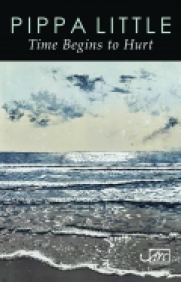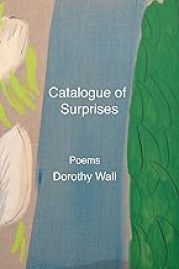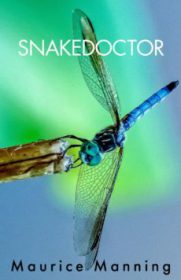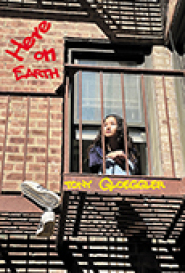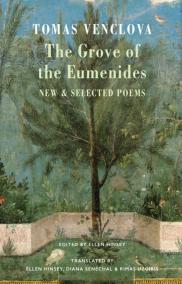
Pippa Little, Time Begins to Hurt,
Arc Publications, 2022. ISBN 9781910345283. £9.99. 77pp.
This is Little’s fifth poetry collection, which offers us a voice of maturity, both in terms of anno domini (here is a woman ‘smouldering’ with potential for new lives after family demands recede) and emotional maturity. Around half the poems are written from a first person perspective, but Little’s skillful lyricism always steers us away from the purely ‘relatable’ and solipsistic into greater depths and universalism.
Born in Tanzania and holding firm to her Scottish lineage, Little sets her poems in a variety of locations – yes, the North East of England (where she has made her home) but also through finger-tip travel and acts of imagination North Korea and Rotorua, New Zealand, where pragmatic elders learn new skills of constructing coffins: in a typically unsentimental turn of phrase,
…last of all we fetch and fold
family linens, hand-sewn, heirloom,
so lying down to rest will smell of home. (“The Coffin Club”).
Other poems more overtly acknowledge their ‘found’ sources, such as the National Trust Housekeeping Manual, and Engels. There is great delicacy in how she interleaves the source idea into her own poem:
a father is a death watch
that grinds through words
leaves what’s left
in grey ash circles. (“A Father Is”).
Other critics have commented on her lyricism, and this is a striking feature of her work, so much so that it is often individual lines rather than entire poems that lodge in the memory. Difficult childhood experiences are deftly portrayed: her father – not the parent who drank but married to the one who ‘stuck like moss to dark places’ – is:
a crane-fly, hurt
and folded (“I was so old when I was not a women”).
‘Those were different times’, she tells us, without drama, and it is the image of the child forced to sit ‘in the darkening room’ eating, with her
… plate a great moon
with a secret which had to be revealed
by swallowing gristle and muscle and fat
which conveys the trauma more effectively that more violent language would.
Images concerning fuses, burning and ash – together with a poem about spontaneous human combustion (“Cinderellas”) – underpin this tense but understated collection with a sense of constituting psychological embers which only take a breath of poetic craft to flare into brightness. On first reading I found the collection somewhat muted, almost despairing, but careful re-reading drew me in to appreciate the subtlety in finding beauty and tenderness in dark corners. Truly, this collection reflects the words of its epigram from Adélia Prado:
‘I love you, love you, love you,
sad as you are, O world.’
Hannah Stone
To order this book click here
Hannah Stone is the author of Lodestone (Stairwell Books, 2016), Missing Miles (Indigo Dreams Publishing, 2017), Swn y Morloi (Maytree Press, 2019) and several collaborations, including Fit to Bust with Pamela Scobie (Runcible Spoon, 2020). She convenes the poets/composers forum for Leeds Leider, curates Nowt but Verse for Leeds Library, is poet theologian in Virtual Residence for Leeds Church Institute and editor of the literary journal Dream Catcher. Contact her on hannahstone14@hotmail.com for readings, workshops or book purchases.
Dorothy Wall, Catalogue of Surprises,
Blue Light Press, 2023.
ISBN: 978-1-4218-3551-8. 102pp. $20.00.
Writing as both a grandmother and a great-granddaughter and everything in between, Dorothy Wall addresses her (our) time on the planet with a potent mixture of despair and hope. As she advises herself in “Where to Find Hope”: “Skeptical self, please believe in the possible / against evidence.” Conviction, if not optimism, always wins out. She concludes the poem: “”What we do next is what matters.”
But it looks grim, no denying it. She describes the conundrum elsewhere, this balance between doubtful/distrustful and resolution/purpose, in the poem, “Notice,” calling it
this high-wire act we convince
ourselves is ordinary,
like a crow feels at home
wire-swaying, sleeping even.
And again in “Notes on Destruction: Florentine Pieta”:
I was tired, too, a secular fatigue, having long ago
left belief
on the workshop floor. I didn’t count on how hard it is
to hold out against collapse, though
that’s what we do in the end, or
try.
This latter poem is introduced with an explanatory epigraph about Michelangelo destroying the tomb-piece he had begun working on at the age of 72, and had worked on for eight years, when, in a fit of frustration, “raging at stone / unmatched to vision,” he took a hammer to his creation. The lesson Wall takes from this apocryphal story? The impulse of the human spirit to bear adversity, to persist,
so we can face imperfection
as if all the failures we collect
and discard, ignoring their trail
behind us, endure
She wisely concludes the poem with the reminder that “even endings continue.” Indeed, the final poem in the collection, “The Fight We Have Left,” ends on the thought: “we won’t let go.”
Epigraphs are a tool that Dorothy Wall uses generously to suggest her theme and clarify her intent. They range from traffic reports heard on National Public Radio to a quotation from the essayist, Elif Batuman on phrenology to an observation on genetics from Siddhartha Mukherjee to a phrase from the Nobel Prize laureate Czelaw Milosz to a verse from the African-American poet June Jordan. “Mr. Yu Reads the Headlines Before Dying” opens with an explanatory note that the poem is inspired by an obituary from the San Francisco Chronicle, in which she refers to “the wounded world he was leaving.” The poem concludes:
When I read the obit, like a banner in the sky,
I want to shout, Mr. Yu! Mr. Yu!
We’re down here learning resuscitation,
hands in the soil, trying to revive that
struggling body, trying to be honest like you,
though honestly, we prefer to be fooled.
Wall writes about her family. The theme of the third section of Catalogue of Surprises, indeed, is ancestry, opening with the poem, “All the Ghosts.” They continue to haunt her! Her discomfort with her grandfather’s attitudes toward race is the theme of “Family History.” He owned a plantation in Louisiana. In a visit to the plantation in 1984, Wall listened to a tape of her grandfather casually using “the N-word” about the workers. She realizes this is her burden; she cannot “cancel” or “erase” “the casual comments that dismiss 400 years of brutality and inhumanity, I need to listen, acknowledge, condemn these words I transcribe, from his mouth to my typing fingers this day in 2022 when we no longer say that but it’s never unsaid.”
We carry history with us, indeed, the luggage of our lives. As she rhetorically asks in the poem “Leaving,” from the same section, “how can you leave the ungone.” It’s a reflection that’s implicit in her poem, “The Afterlife,” in which she writes:
The thought comes of my
grandmother
dying at 102, 11 days before 9/11,
spared the future. What each of us
is not required to bear.
She also writes lovingly about her mother and her grandchildren. “My Grandson wants to Go to Chernobyl” is a poem about recovering from apocalyptic disaster that celebrates her grandson’s courage and curiosity along the way. “Not Today” evinces a protective concern for her granddaughter. “This Morning” also refers to her granddaughter, singing “Hakuna Matata” – “there are no troubles” – from The Lion King, as she showers. “It’s as if we have time,” Wall writes. “This morning The Lion King, yesterday Hamilton, a 230-year-old drama alive in her throat, washed by water, she belted out ‘Burn!’” To sum it up, as she writes in “Haiku,” kids are full of optimism, full of wonder; “they want to taste / that green peach, and why is it bitter.”
Writing is Dorothy Wall’s survival strategy through the precariousness and uncertainty of this life. “Writing was born from longing,” she writes in “Writing as Divination.” Indeed, we create “Worlds of our own making.” In the very first poem, “Hemingway Puts Down His Gun,” Wall recognizes the power of writing as a survival strategy.
As long as words, strong as a rope
hauled him into another day
he knew he’d keep going
Of course, eventually Hemingway couldn’t put that gun down. But Dorothy Wall recognizes the need, buoyed by what may be naïve wishing, to persevere against all odds. Climate change is real; cataclysmic events happen all the time, regular as clockwork; species are vanishing all around us, every day. But as she writes in “Towhee on the Flagstone” about yet another fragile, vulnerable being, we must
take the long view
that’s our job these days
two in the bush worth
more and
more.
Charles Rammelkamp
To order this book click here
Charles Rammelkamp is Prose Editor for BrickHouse Books in Baltimore, where he lives, and edits The Potomac, an online literary journal. http://thepotomacjournal.com. His photographs, poetry and fiction have appeared in many literary journals. His latest book is a collection of poems called Mata Hari: Eye of the Day (Apprentice House, Loyola University), and another poetry collection, American Zeitgeist, is forthcoming from Apprentice House.
Maurice Manning, Snakedoctor,
Copper Canyon Press, 2023.
ISBN: 9781556596988. 128pp. $18.00.
There’s something Taoist about Maurice Manning. Close your eyes and he’s wandering around the 6th Century BCE landlocked Henan province instead of the Twenty-first Century Kentucky countryside, philosophizing about love, time, art, remembering poignant folk stories about moonshiners, his father and grandfather, all in the context of lush and lonely rural Kentucky, musing, generally, about existence and how we fit in. Manning concludes the poem, “After Reading Charles Wright, I Turn Out the Light and Listen to the Rain”:
Anger stiffens everything.
What a waste of time. You have to go
for wonder that’s simply out there
and wonder that comes from reflection and waiting
or appears to appear coldly from nothing
and quietly ticks in unknown Time.
I’ll probably have to learn Italian.
God knows what else I’ll have to do.
This attitude, pervasive throughout the collection, mirrors the Taoist concept of emptiness, Wu, an emotional/psychological stance associated with the lack of worldly desire that includes the actions that arise from this state of mind, as well. As a bonus, the poet’s self-deprecating humor is on display as well. These are deep thoughts, but he shies away from “profundity.” And yet – it is that attitude of child-like wonder that he cultivates. (Think Wordsworth’s “My Heart Leaps Up” –“The Child is father to the Man; / And I could wish my days to be / Bound each to each by natural piety.”).
The first thing you notice about Maurice Manning’s verse is the minimal use of stanza breaks. Poems flow down the page like the voice of a voluble man with an urgency to speak. The poem, “Art,” for instance, is a thirty-six line poem that ends, “Imagination
and memory, with real things
and two nothings strangely assembled,
part of a song, and the lonely dream
of being alive in a place on earth.
He’s just been musing about a contraption he’s fashioned from broken bits of a cast-iron cage and a wrecked horseshoe (it “resembles a child’s invention”). The sculpture sways in the breeze, “recalling its first design– / to cushion the buckboard bench” of a wagon rolling unhurriedly down the road. Then Manning’s imagination meanders, as it is wont to do all throughout these poems, and he thinks of the horse that pulls the wagon; he gives it a name, Jupiter, and he thinks of the man who drives the wagon, nodding off to the soporific rhythm of the horse pulling the wagon, the fragment of a song about a woman’s slippers drifting through the driver’s mind. This, indeed, is “Art.”
“Mr. True” is a 54-line poem, all in a single “stanza” about his father’s habit of bringing strangers home from the bar when he went out drinking. They’d stumble in drunk, his father pitying the strangers who had no place to go. Mr. True was one of these men, a giant over seven feet tall. Mr. True was “magical,”
and I learned that taking in a stranger
is a decent thing to do, and you
can do it singing. Whatever torment
my father knew, he had a heart
for strangers and their suffering,
and a song to bring them through the door.
Song, indeed, human and animal, forms an important part of the country world Manning inhabits. The very title of “The Gospel of Music” tells you how important it is.
In the beginning was the word,
and the word was music and birds and donkeys,
and God was a serious banjo player
with an inscrutable face, who said
to everyone alive, I made
the world for singing. Now, you sing.
“The Latch” is a poem that begins with the simple sound of the click of a gate’s latch but moves on to “the song of mercy,” “and I / a wanderer, have entered the song, / and must be singing, too.” At the end of “Blue Hole,” a poem whose principal theme is Time, Manning’s father laments to him, “I wish you could have heard him sing,” about Manning’s grandfather, whom he never met.
“Sinner Man” is likewise about Manning’s grandfather and also contemplates “Time.” Manning writes that imagining his grandfather “is an obligation I have to Time,” which, he writes, “is a stream with no beginning.” Manning’s grandfather killed three men, two apparently in self-defense, in 1938, and the other, in 1939, “to settle the feud,” which later in the poem he refers to as “the hillbilly habit” to fight – over a woman, over wounded pride, over a schoolteacher switching your child, over any number of provocations.
In the very first poem, “Sugar,” Manning refers to “the long garden of Time.” In the poem, a boy’s father beats him regularly with his belt (presumably Manning and his father, though the voice relates the story in the third-person). It’s one of those things “that might be done in the name of love, / the unforgivable acts of love.”
No less is Love an important theme throughout the book. “I believe in poetry and love. I believe in the beauty of the woods,” he writes in “The Moon Is Still in the Sky,” one of “Three Landscapes.” “The Red Chair,” which riffs on the 23rd Psalm, considers his contemplations from his easy chair (“I sit a lot in a red chair. / I stare into space…”). He confesses, “I’m so involved with love it’s hard / to fathom, hard to tell how much.” In “Collards” he declares that “poetry relies on love.” “Love renews itself and keeps / beginning,” he writes in “Canebrake Love and Water,” “as water waters the stream / and the stream’s entrancing motion is stirred.”
In the title poem, “Snakedoctor,” spoken to his first-grade teacher, Marvella Hall (“so tall and strict”), now presumably long dead (“You must / be older than Job’s pet possum / if you’re still stepping on the ground.”), Manning asks,
All things alive and dead and dying
and rising to life. Is there a way
to grasp it all, the joy, the grief,
and see it all together, not
as doom or fate, but as a whole
complete and plainly unified,
and a way to be alive in the world?
That poem ends with his reassurance to Marvella: “I wanted you to know that you are loved, / you are loved, you are loved, you horsy old woman.”
Love, time, silence: the big abstractions move through the specific details of Snakedoctor like an invisible wind, from the story of the rooster, Lying Tom, in “A Cackalacky Yardbird Reconsidered” to the old moonshiner in “Frog Eyes.” Manning starts the poem, “An Orchard at the Bottom of a Hill” with the question, “Why don’t you try just being quiet?” Indeed, as the Taoists say, the value of a glass is in its empty space.
Charles Rammelkamp
To order this book click here
Charles Rammelkamp is Prose Editor for BrickHouse Books in Baltimore, where he lives, and edits The Potomac, an online literary journal. http://thepotomacjournal.com. His photographs, poetry and fiction have appeared in many literary journals. His latest book is a collection of poems called Mata Hari: Eye of the Day (Apprentice House, Loyola University), and another poetry collection, American Zeitgeist, is forthcoming from Apprentice House.
